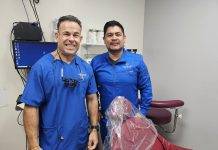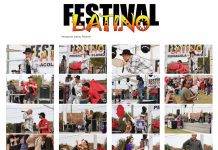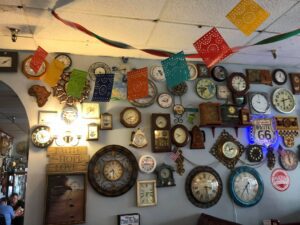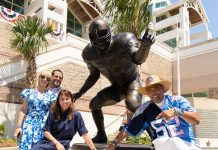¡Viva México y Dios bendiga a América!
Cuando entre al Time to Eat Country Café en Theodore, Alabama, es posible que se sienta abrumado por los más de 1500 relojes que decoran casi cada centímetro de las paredes interiores, pero eso es solo el comienzo de las sorpresas que el restaurante tiene reservadas.
Escondidos en la acogedora esquina de Theodore Dawes Plaza, Alfredo Fernández García y su esposo Kenneth Clark abrieron el restaurante en el 2001. Los años transcurridos desde entonces están grabados en la mente de Fernández con increíbles detalles y fechas específicas.
“Conocí a Ken el 22 de febrero del 1999,” recuerda Fernández.
Los dos estaban en Texas en ese momento. Clark estaba trabajando en un campo que utilizaba su título en ciencias de la computación y su maestría en física. Aunque Fernández estudió derecho en México, se encontró trabajando en tres trabajos para ganar lo suficiente para sobrevivir y enviar dinero a su madre.
Aproximadamente un año después, la pareja pasó por una mala racha y se separó. Clark utilizó sus ahorros para abrir el restaurante en Theodore para que lo administrara su madre. Poco después, Clark le pidió a Fernández que fuera a Alabama y ayudara a administrar el café.
Se suponía que solo sería por tres meses,” dijo Fernández. “Luego, seis meses más se convirtieron en un año, luego en dos años. 22 años después, todavía estamos aquí.”
Por supuesto, no siempre fue fácil. De hecho, ser un inmigrante abiertamente homosexual en una ciudad rural del sur era a menudo un gran desafío. Comenzaron a promocionar el restaurante entre la comunidad gay en Mobile, instando a los clientes potenciales a pasar por el café cuando viajen a Biloxi.
Pero algunas personas no estaban preparadas para el cambio. Fernández recuerda que algunos clientes se ponían agresivos con él y su personal unas dos o tres veces por semana. Aún así, perseveraron e insistieron en hacer de su café un lugar seguro para que todos se relajaran y disfrutaran de una comida.
“Alabama ha cambiado mucho desde esos días,” dijo Fernández.
Agregó que muchos de los clientes que tenían dificultades en aceptar a la pareja cuando abrieron sus puertas ahora son clientes habituales que visitan el restaurante con frecuencia.
“Me he ganado su respeto,” dijo.
Como si superar la intolerancia no complicara la vida lo suficiente, el estatus migratorio de Fernández se convirtió en un obstáculo que casi arruinó todo por lo que habían trabajado.
Había excedido su visa y en 2014 lo detuvieron en Hattiesburg, Mississippi y fue arrestado. Esta era su segunda parada y anteriormente había sido puesto en libertad condicional y se le ordenó salir del país cuando vivía en Dallas.
Fernández recuerda que lo obligaron a acostarse en el suelo y lo esposaron mientras los transeúntes observaban.
“Estuve en la cárcel aproximadamente de una semana,” dijo Fernández. “No podía hacer nada, ni siquiera hacer una llamada telefónica.”
Otro detenido tenía un teléfono celular que le permitió usar para llamar a Clark. Clark contrató de inmediato a un abogado, pero la mañana en que se iban a encontrar, Fernández fue trasladado a un centro de detención en Monroe, La.
“Me dijeron en un lenguaje espantoso que tenía que irme [del país] y nunca volver,” dijo Fernández. “[El oficial] nos dijo que firmáramos un papel que decía que estábamos de acuerdo en ser deportados, pero eso no era cierto. Hablaba inglés, así que sabía lo que decían los documentos.”
Pero al estar en un estado de miedo, Fernández dijo que firmó el papel y abordó un avión a Laredo, Texas donde él y otros nos metieron en un autobús de la prisión.
“Todo el tiempo estuvimos esposados y nuestras piernas estaban encadenadas. Me hizo sentir degradado, como basura,” dijo Fernández. “Nunca hice nada más que trabajar, incluso pagué impuestos con ITIN. Pero ellos no vieron eso. Solo querían que me fuera.”
Fernández dijo que la única persona que le mostró humanidad fue otro hombre gay, un oficial en Luisiana que trató de ayudarlo.
“En todo ese odio, había un hombre que quería ayudar,” dijo Fernández según se le quebrar su voz. “Cuando supo que me iría esa mañana, corrió a la cárcel y se disculpó profusamente.”
“Me deportaron el 14 de mayo del 2012,” relata Fernández. “Prohibida la entrada a los EE. UU. por diez años, más 20 años adicionales por desobedecer a un juez federal en Texas.”
Fernández fue enviado de regreso a su casa en la Ciudad de México, donde dice que su madre lo recibió con los brazos abiertos.
“Mi madre me recibió como el hijo pródigo,” dijo. “Ella dijo que no le importaba lo que pasaba, ni lo que estaba pasando. “¡Eres mi hijo!” Ella me tomó bajo su protección de nuevo.”
La reunión familiar resultó ser oportuna. Clark se unió a Fernández en México. Se casaron el 23 de junio del 2014.
Fernández está agradecido de que México concediera el matrimonio entre personas del mismo sexo y señaló que cambiaron su ley tres años antes que los Estados Unidos. También está agradecido por el tiempo que pudo pasar con su madre enferma. Fernández cuidó de su madre antes de que muriera el 27 de enero del 2017. Tenía 85 años.
“Pude darle el amor y la atención que se merecía,” dijo.
Clark regresó a los Estados Unidos y la pareja de recién casados comenzó el proceso de llevar a Fernández de regreso a Alabama. El restaurante jugó un papel importante en su caso. El cuidado de su madre y del restaurante comenzó a afectar la salud física y mental de Clark.
“Todo esto en conjunto me ayudó a demostrarle al gobierno de los Estados Unidos que me necesitaban aquí en un nivel extremo y sus vidas dependían de mi regreso,” dijo Fernández. “También de que era un miembro contribuyente a la sociedad, económicamente autosuficiente.”
Fernández recuerda cómo tuvo que viajar a Chihuahua al consulado para obtener su tarjeta verde en Juárez. Se conmovió emocionalmente al ver personas ayudando a otros que estaban esperando entrar al consulado. Muchos les daban comida y refugio para dormir.
“Es asombroso cuánto comparten,” dijo Fernández.
Dos años y medio después, el 19 de enero de 2019, Fernández regresó a Time to Eat.
Desde entonces, Fernández dijo que su misión ha sido cuidar el restaurante y celebrar públicamente a México y EE. UU.
“Este lugar es un lugar con alma, no solo un lugar para comer. Mis clientes vienen a reír, a llorar, a contarme sus penas y sus alegrías,” dijo.
Fernández agregó: “Mi misión es asegurar que las personas sepan que todos son bienvenidos sin importar la religión, la raza o cualquier cosa, y que las personas serán tratadas bien aquí.”
Viva Mexico and God Bless America!
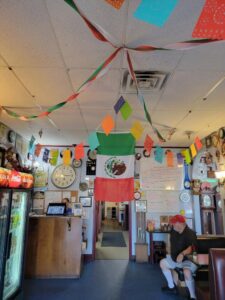 When you walk into Time to Eat Country Café in Theodore, Alabama, you might be overwhelmed by the more than 1500 clocks decorating nearly every inch of the interior walls, but that just the beginning of the surprises the restaurant has in store.
When you walk into Time to Eat Country Café in Theodore, Alabama, you might be overwhelmed by the more than 1500 clocks decorating nearly every inch of the interior walls, but that just the beginning of the surprises the restaurant has in store.
Tucked into the cozy corner of the Theodore Dawes Plaza, Alfredo Fernandez Garcia and his husband Kenneth Clark opened the restaurant in 2001. The years since then are etched in in Fernandez’s mind with incredible detail and specific dates.
“I met Ken on February 22, 1999,” Fernandez recalls.
The two were in Texas at the time. Clark was working in a field that utilized his degree in computer science and Master’s in physics. Though Fernandez studied law in Mexico, he found himself working three jobs to make enough to survive and send money back home to his mother.
About a year later, the pair hit a rough patch and separated. Clark utilized his savings to open the restaurant in Theodore for his mother to manage. Shortly after, Clark asked Fernandez to come to Alabama and help run the café.
It was only supposed to be for three months,” Fernandez said. “Then six more months turned into a year, then two years. 22 years later, we are still here.”
Of course, it wasn’t always easy. In fact, being an openly gay immigrant in a rural southern town was often quite a challenge. They began promoting the restaurant to the gay community in Mobile, urging perspective customers to stop by the café when traveling to Biloxi.
But some people weren’t ready for change. Fernandez recalls some customers getting aggressive with him and their staff two or three times a week. Still, they persevered and insisted on making their café a safe place for everyone to relax and enjoy a meal.
“Alabama has changed a lot since those days,” Fernandez said.
He added that many of the customers that had difficulty accepting the couple when they opened their doors are now regular customers that visit the restaurant often.
“I have gained their respect,” he said.
As if overcoming bigotry doesn’t complicate life enough, Fernandez immigration status became an obstacle that nearly ruined all they had worked for.
He had overstayed his visa, and in 2014 he was pulled over in Hattiesburg, Miss., arrested and detained. This was his second stop and had previously been placed on probation and ordered to leave the country when he lived in Dallas.
Fernandez recalls being made to lay on the ground and handcuffed while bystanders watched.
“I was in jail for about a week,” Fernandez said. “I couldn’t do anything, not even make a phone call.”
Another detainee had a cell phone that allowed him to use it to call Clark. Clark immediately hired a lawyer, but the morning they were to meet, Fernandez was transferred to a detention center in Monroe, La.
“I was told in awful language that I was to leave [the country] and never come back,” Fernandez said. “[The officer] told us to sign a paper that said we agreed to be deported, but that wasn’t true. I spoke English, so I knew what the papers said.”
But being in a state of fear, Fernandez said he signed the paper and boarded a plane to Laredo, Tex. where he and others were put us in a prison bus.
“The entire time, we were handcuffed and chained to our legs. It made me feel degraded, like trash,” Fernandez said. “I never did anything but work, even paid taxes with ITIN. But they didn’t see that. They just wanted me gone.”
Fernandez said the only person that showed him any humanity was another gay man, an officer in Louisiana who tried to help him.
“In all that hate, there was one man that wanted to help,” Fernandez said with a crackling voice. “When he knew I was going to be gone that morning, he rushed to the jail apologizing profusely.”
“I was deported on May 14, 2012,” Fernandez recounts. “Banned from the U.S. for ten years, plus an additional 20 years for disobeying a federal judge in Texas.”
Fernandez was sent back to his home in Mexico City where he says his mother welcomed him home with open arms.
“My mother welcomed me like the prodigal son,” he said. “She said she didn’t care what happened, what was going on. ‘You are my son!’ She took me under her wing again.”
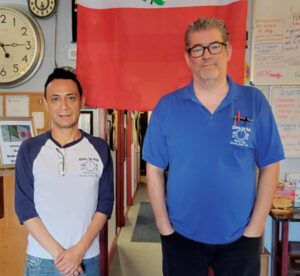 The family reunion proved to be timely. Clark joined Fernandez in Mexico. They were married on June 23, 2014.
The family reunion proved to be timely. Clark joined Fernandez in Mexico. They were married on June 23, 2014.
Fernandez is grateful that Mexico granted same-sex marriage noting that they changed their law three years ahead of the U.S. He is also grateful for the time he was able to spend with his ailing mother. Fernandez cared for his mother before she died on January 27, 2017. She was 85 years old.
“I was able to give her the love and care she deserved,” he said.
Clark returned to the U.S. and the newly married couple began the process of getting Fernandez back to Alabama. The restaurant played big part of his case. Caring for his mother and the restaurant began to wear on Clark’s physical and mental health.
“All this together helped me prove to the U.S. government that I was needed here on an extreme level and their lives depended on my return,” Fernandez said. “Also that I was a contributing member of the society, economically self-sufficient.”
Fernandez remembers how he had to travel to Chihuahua to see the consulate about getting his green card in Juarez. He was emotionally touched by seeing people helping others that were waiting to see the consulate. Many would give them food and shelter to sleep.
“It is amazing how much they share,” Fernandez said.
Two-and-a-half years later, on January 19, 2019, Fernandez was back at Time to Eat.
Since then, Fernandez said his mission has been to take care of the restaurant and to publicly celebrate Mexico and the U.S.
“This place is a place with soul, not just a place to eat. My customers come to laugh, cry, tell me their pains, joys,” he said.
Fernandez added, “My mission is to make sure people know that everyone is welcome regardless of religion, race, anything, and people will be treated well here.”




